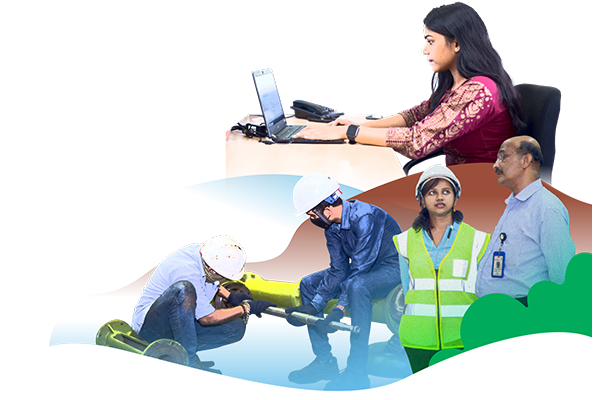

* Includes only manpower numbers of Tata Power, TPREL, Mundra, TPSSL, TPRMG, PTL, WREL, MPL, IEL, TPTCL, TPADL, TPIPL, TERPL, TPCDT, FENR, NELCO,
TPDDL, TPSODL, TPCODL, TPWODL and TPNODL
** Workmen includes Non-Management Employees
*** FDA & SE includes employees and supervisory trainees on direct contract with the Company
Key linkages

Material topics




Key focus areas
Our people strategy is guided by our Group values, meritocracy, continuous development and the philosophy of purpose-led workplace. Across our organisation, we nurture our people to be leaders and specialists, contributing to business growth, while charting their individual career development.
To ensure that our people have a rewarding experience, we focus on seven major focus areas as given below.








Talent acquisition and retention
With a continuously evolving external environment, we constantly evaluate our requirements for skilled professionals, aligned with our business needs. Through fair, effective and systematic talent acquisition practices, we ensure that we have the talent to tackle the challenges of tomorrow, while helping deliver on organisational goals today. Adding to this is our diversity policy, which ensures that our workforce is balanced on various measures of diversity – from gender and background to experience and skill set.
New hires

With industry-benchmarked compensation and reward mechanisms, we continue to hold our position as a desired employer. Our performance management systems pegs employee performance to various levers including innovation and customer centricity.
Attrition levels

Learning is a core value at Tata Power, and we constantly strive to provide best in class learning opportunities to our employees, ensuring relevant capabilities are developed for enhanced performance and productivity.
Training design is based on in-house AMP leadership competency framework that has been copyrighted. We have a robust employee development framework that comprises our 3 Tier Leadership Development programs, Senior Leaders Development Program (Tier 1), Achieving Your Leadership Potential (Tier 2) and Emerging Leaders Program (Tier 3), that have been conceptualised, designed internally and are executed and delivered in collaboration with best in class management institutions, IIM A, SPJIMR Mumbai, XLRI Jamshedpur and TMTC Pune, and our Future Skill academies in areas of Digital, Project Management, Sales and Customer Centricity that are aimed to make our employees future ready. We adopt a blended learning pedagogy for employee development pivoted on class room training, virtual live training, e-learning, coaching, action learning projects, on job training and mentoring among others.
Average hours of training per employee in FY22*
(levelwise)
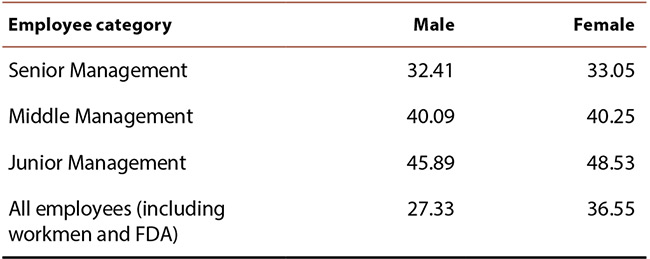
*Includes data of Tata Power, TPREL, Mundra, TPSSL, TPRMG, PTL, WREL, MPL, IEL, TPTCL, TPADL, TPIPL, TERPL, TPCDT, FENR and TPDDL

Employee engagement
We foster a continuous dialogue between the employees and the management with formal and informal initiatives. Through various engagements, we continuously listen to their concerns and aspirations, and ensure that their requirements are addressed in the most optimal way. Their feedback and voice help us refine our policies and programmes, and enable continuous improvement on the people experience front. About 47.66% of our employees are represented by unions and collective bargaining agreements. We maintain strong and enabling labour relations practices, to ensure that their rights are respected and needs addressed.
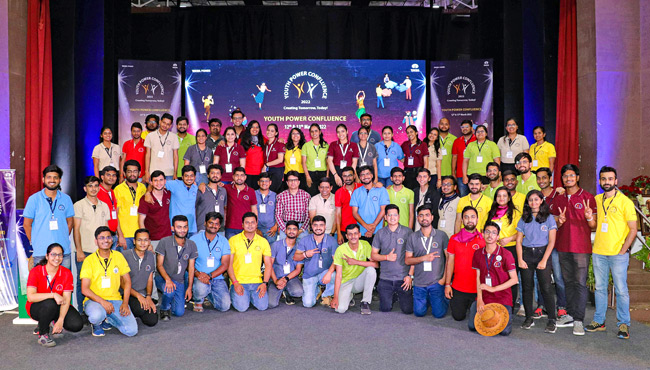
We have a process of annual engagement survey process of capturing feedback and actioning to enhance employee experience. We are now looking to capture more real time and frequent feedback focusing on specific employee cohorts which have specific needs and challenges of each group, and action upon feedback received. We have specific employee engagement initiatives that ensure that their productivity remains optimal, while helping them maintain a fine work-life balance. Avenues such as Achiever’s Portal, Pulse Connect, VOICES, Engagement Action Planning, Town halls and Connect 2 Solve help in promoting open dialogues with employees and empowering them. It also offers employees a platform to express themselves, recognise each other, share their views and provide feedback on policy development as well as deployment. These initiatives have emerged and are continuously improved based on feedback received from employees and organisation's changing imperatives. Efforts are made to resolve employee grievances in a timely manner.
In FY22, we conducted ‘Youth Power Confluence’, an in-person engagement programme for all the fresh campus recruits, comprising sports, business simulation games and workshops.
To increase employee engagement and connect, we utilised various digital platforms such as:
ParibartanaRuPragati (#PRP) change management programme was conducted at newly acquired Odisha Discoms that saw 12K formerly government employees being successfully integrated and enthusiastically delivering results. We also publish an Engagement Activities Calendar with standardised events across the Company covering major festivals (#Festithon), birthday celebrations and sports events.
On Valentine’s Day, “Love is all we need” campaign was launched to create engagement, awareness and celebration of 5 dimensions of love: i) Being grateful ii) Embracing differences iii) Driving inclusion iv) Demonstrating empathy v) being non-judgemental. This was to nurture an environment of open communication and support that would lead to high performance.

Health and safety
At Tata Power, we follow the adage “Safety is a core value over which no business objective can have higher priority." Led by this philosophy, we also aspire to be a leader in safe work practices in the global power and energy business. This aspiration is anchored by three key tenets:
Global leadership underlined with an ambition to be world-class, and enabled by digitalisation and new technology intervention
Safe work practices so that employees feel safe to work, all stakeholders experience safety and safety is embedded in the organisation’s DNA
Safety performance to ensure no harm and no injury, powered by benchmarked approaches
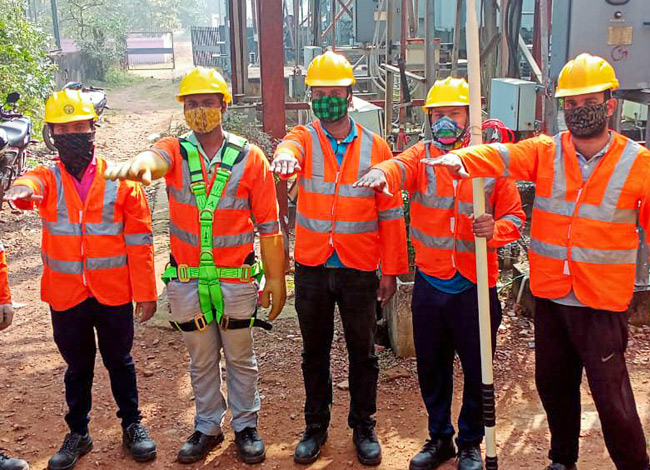
We accord paramount importance to the health and safety of all our employees, suppliers, partners, customers and all other stakeholders. We ensure this by engaging the Tata Power Safety Management Framework, which covers all our business activities and is aligned with the Tata Group Health and Safety Management System as well as ISO 45001:2018 requirements. We have established the Hazard Identification and Risk Assessment (HIRA) process for both routine and non-routine jobs. We regularly provide HIRA and Job Safety Assessment (JSA) trainings to our operation, maintenance and service engineers.
Target of Zero
fatalities, recordable work related injuries and LTIs
At Tata Power, we are committed to fostering a positive environment in our workplaces that promotes holistic wellbeing of our employees, through programmes that support them to achieve their goals and lead a fuller life, which in turn will help the business thrive. Our approach encompasses physical, mental, emotional and financial wellbeing, and covers aspects of policies, infrastructure, benefits, programs and leveraging technology. Through partnerships such as with 1to1help.net, GOQii, we are committed to supporting holistic health of our employees, and are focused on delivering clear outcomes in terms of improved health of employees, measured through individual and organisational health index.
Indirectly employed/contractual workforce

Our other key interventions include:
In FY22, we continued to improve on our health and safety performance, led by our systematic processes, technology-led initiatives and overall orientation to safety culture.

Employee welfare, feedback and policies
We place significant importance on the overall welfare of our employees, through holistic awareness and action programmes.
Policies at Tata Power are created/reviewed continuously to meet the needs of the organisation and different workforce segments. Inputs are taken from employees through formal and informal platforms such as engagement surveys, internal surveys, feedback from senior leaders and business HR. Policies are designed to ensure that employee feedback, industry norms and the legal norms are not only met in their true spirit, but also exceeded. For example, the Gender Diversity Policy provides for an exclusive one-year sabbatical for meeting family requirements; the Health & Wellness Policy provides benefits such as medicines for chronic illnesses including family members; inclusion of parents-in-law in the mediclaim scheme; Medical Fund Scheme providing unlimited coverage of medical expenses in excess of the eligibility; voluntary OPD to reimburse OPD expenses among others.
Our integrated Leave Policy addresses the leave requirements of various employee segments by providing leave for marriage, paternity, adoption, surrogacy, higher education, compassionate circumstances, sabbatical and others, in line with the industry best practices in the area of employee benefits.
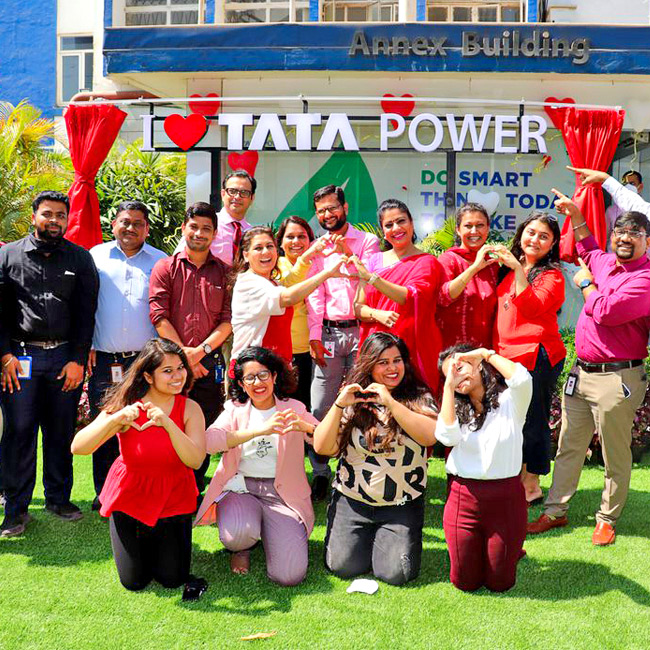

Diversity and inclusion
Our diversity ratio for campus was over 30% last year. We have 22% gender diversity in sales and customer facing roles, 34% in finance and accounting roles and 40% in digital and technology roles.
We are an equal opportunity employer working with the core belief that diversity alone can bring in perspectives that can promote innovation and enable a future-fit organisation. Even as a heavy industry, we take active interventions in ensuring that our workforce has notable non-male participation. We have an articulated vision and clarity on D&I outcomes we want to achieve at the Tata Power Group level. This dovetails into our performance scorecards, with specific goals for leaders, managers and HR, and these metrics get tracked on a quarterly basis and discussed with leadership with clear actionables. To create a culture of teamwork and to capitalise on the diverse thinking of the workforce, especially our younger workforce, various cross functional teams, across the levels of the organisation, are formed to work on critical projects for the organisation, e.g. Innorise.
Our approach and plans for diversity and inclusion are very contextual to Tata Power and based on segmented approach for each of the Business clusters, as the challenges pertaining to D&I are different in each cluster. Our focus areas are gender diversity, generational diversity and inclusion of persons with disabilities.
From a gender diversity perspective, women career trajectories are specifically mapped out and supported through various initiatives right from recruiting, mentoring program, to career progression, to a better work-life balance, and enabling life-stage transition. Through focused initiatives and programmes, we have been able to maintain the gender diversity ratio of 8% even after acquisitions of large entities, that have been traditionally gender skewed.
We have been consistently winning the KelpHR PoSH Awards, which recognises and rewards companies across all industries for the best Prevention of Sexual Harassment (PoSH) practices.
Women employees across roles*
Campus hires
Sales and customer facing roles
Finance and accounting roles
Digital and technology roles
Parental leave and return to work in FY22
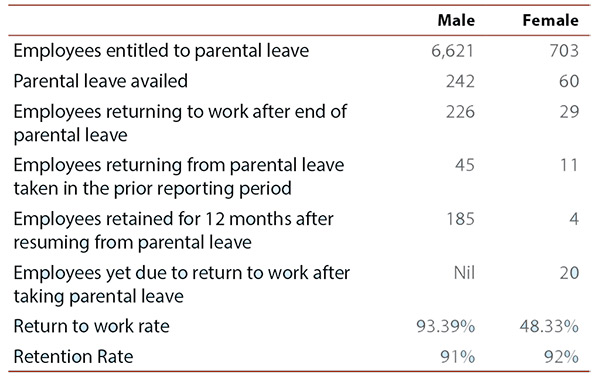
Gender pay comparison*
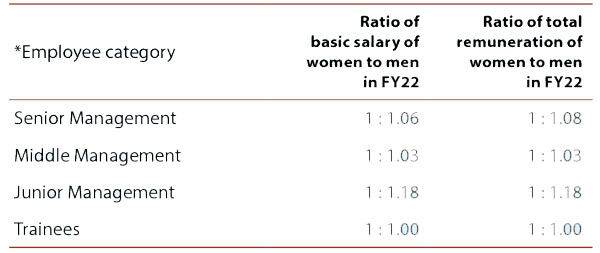
* Considers remuneration for employees of Tata Power, TPREL, Mundra, TPSSL, TPRMG, PTL, WREL, MPL, IEL, TPTCL, TPADL, TERPL, TPCDT, FENR only
Our enabling framework for diversity and inclusion is underpinned by three aspects:
Policies
Development programmes
Safety and care
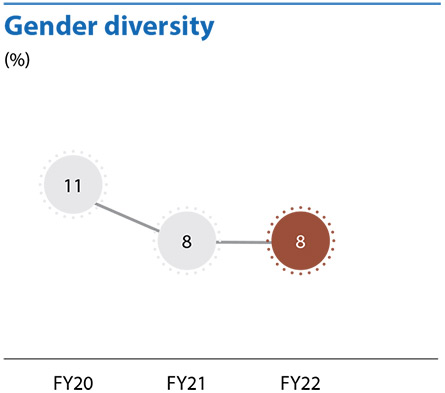
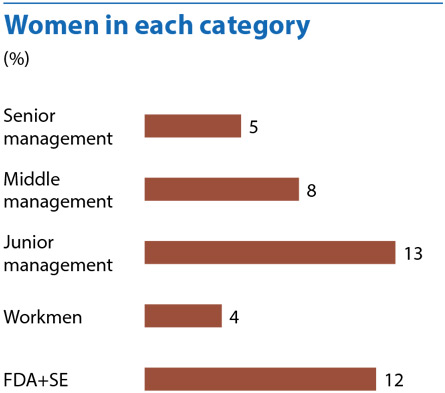
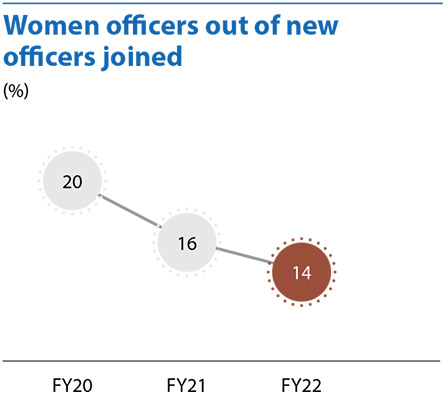
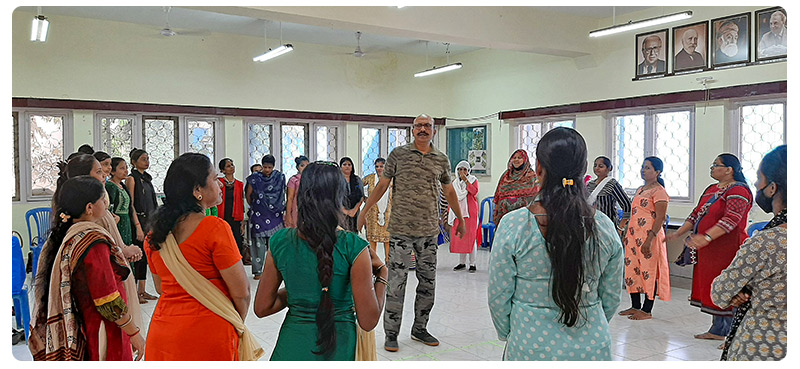

Succession planning
As a part of our talent management strategy, we identify roles that require succession in the near or medium term, and plan employee development accordingly.
At Tata Power, succession planning is conducted to ensure availability and readiness of capable manpower to take up critical roles as when required and thus promote business continuity from a critical resource standpoint. This is done for critical positions with a focus on those where incumbents are superannuating; suitable successors are identified in immediate, 1-2 year and 3-5 year categories with assigned development plans. Successor development and movement are closely monitored by the Apex leadership team. Succession planning is the best practice in Tata Group.
Employee Retirements
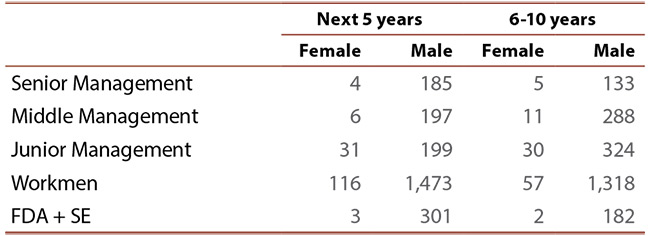
Integrated Leadership Development Framework
Structured leadership development programmes at all work levels will provide assured leader pipeline.
Tier 1Senior Leaders’ Development Programme
15 months AMP@ IIMA for senior leaders comprises coaching, action learning projects, Hogan assessment, with alumni status
Tier 2Achieving Your Leadership Potential 2.0
6 months leadership development program in collaboration with TMTC & SPJIMR for officers in mid to senior roles to prepare for higher responsibilities
Tier 3Emerging Leaders’ Programme
4 months leadership development program in collaboration with TMTC & XLRI for young officers towards sustained performance and managing teams
Talent NXT
Talent NXT is a programme that endeavours to create next generation leaders by identifying high-potential talent to be groomed for CXO level positions.
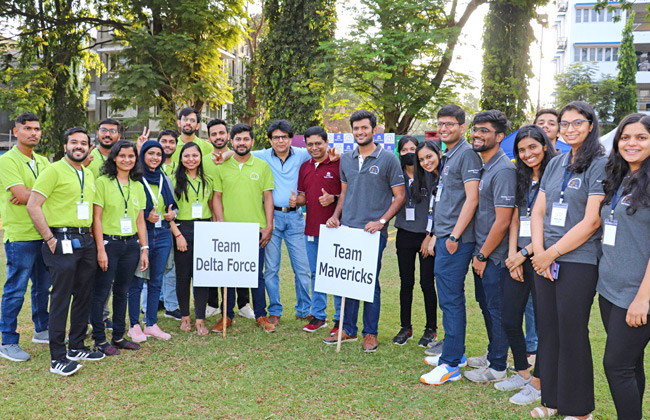

Human rights
As part of the renowned Tata Group, we uphold the highest standards of human rights across our value‑chain. We have zero tolerance approach towards any breach of our conduct regarding human rights and/ or discrimination. As an outcome, we have strict measures in place to ensure zero child/bonded labour within our organisation and among organisations part of our direct value-chain. We have specific policies regarding any harassment or prejudice at workplace, and we constantly sensitise our employees on active and passive behaviours that may constitute a violation of such policies.
Our human rights policy is aligned to the principles of the International Labour Organisation (ILO) and United Nations Global Compact (UNGC). We are also planning the preparation of a comprehensive human rights due diligence framework in line with the UN Guiding Principles Reporting Framework. The Policy is refined periodically to account for global best practice alignment and continued relevance. The policy is a key part of our pre‑induction training and various refresher modules.